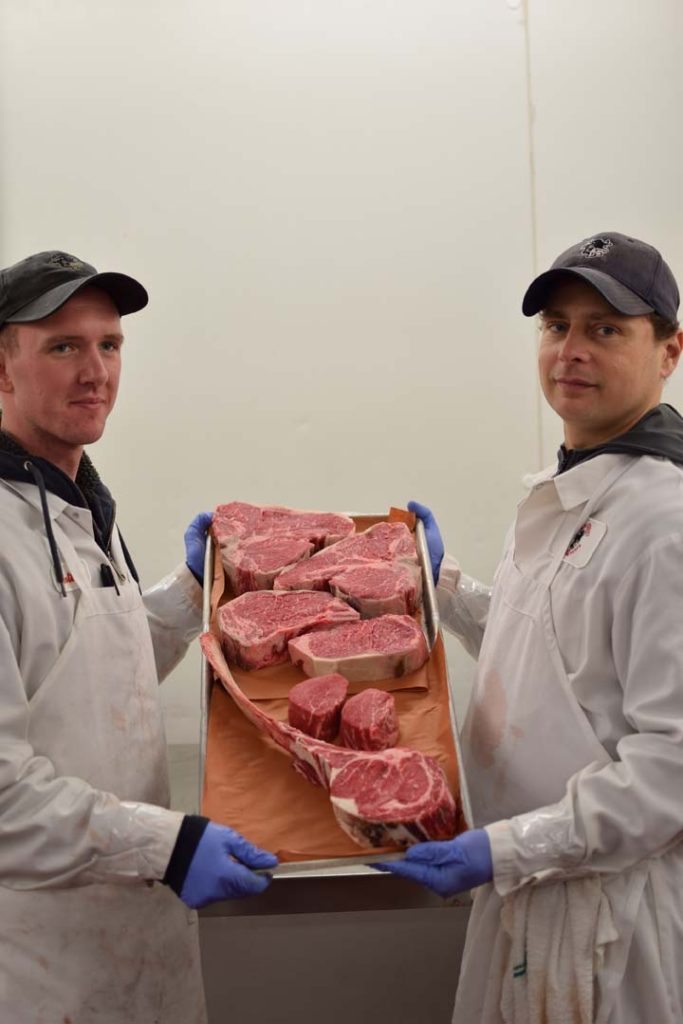Farmingdale mainstay looks to e-commerce as next frontier
 Julius Seelig was worried. For decades, customers at his Main Street butcher shop in Farmingdale bought their meat and handed him cash.
Julius Seelig was worried. For decades, customers at his Main Street butcher shop in Farmingdale bought their meat and handed him cash.
Now it was the ’90s and his son, Kent, was selling meat to large buyers—and not getting paid on the spot.
“My grandfather hated the wholesale business,” related third-generation meat marketer Lee Seelig in his office at the Farmingdale Meat Market and Main Street Wholesale Meats, above the store Julius founded in 1946. “He told my father, ‘You mean you gave them meat, and they didn’t pay for it?’ He did not like the idea of receivables.”

Lee, the president of the family firm, hailed his father’s entrepreneurial skills in building an enterprise that boasts a payroll of 52 (including 11 butchers) and 14 delivery trucks.
“Kent’s still active, still the CEO and guiding light,” Lee said.
He noted the demise of the neighborhood butcher shop as lifestyles and eating habits have changed.
“If it weren’t for wholesale, we wouldn’t be here,” he said, adding that selling to restaurants, catering halls, country clubs and the like accounts for about 95 percent of the business.
Now the Seeligs are moving into the next marketing frontier. Recently, the firm launched TheSteakSource.com, offering the USDA choice/prime (highest rated) and dry-aged meats to online shoppers nationwide.
E-Commerce Logistics
“People have been telling me for 10 years, ‘You should be selling on the Internet,’ ” Seelig said. “It’s a whole other realm. We have to follow up; it’s not just a matter of putting up a website. There are some new and unique challenges for us. And there is a lot of competition out there.”
Seelig said that being a USDA-inspected facility is a big selling point for marketing its online offerings.
“The logistics of shipping meat gets tricky,” Seelig observed. “You have to use cooler ice and packs. A one pound steak may need four pounds of packing.”

Further, “You have to ship the meat overnight. It ships cold, not frozen. It gives the buyer the option to freeze or cook.”
Refreezing meat, he said, will not lead to a gourmet eating experience.
The Seeligs have hired Brandon Hittner to run the website.
“We want to take [the firm’s] exceptional customer service and apply it to this e-commerce platform,” Hittner said.
Among the kind of research Hittner has been doing is cross-referencing zip codes that contain high incomes with those that don’t have meat retailers. Finding, say, a Ferrari dealership is a clue that an area has the means to afford luxury market items—such as shipped prime meats.
“We’re using Facebook and Google to target geographic regions,” Seelig said. “For the website to sustain itself, it must narrow its focus to those with disposable income.”
A Lifetime With Meat
Lee Seelig began working in the family firm at a young age. He took a break in his 20s, managing bands and being part of the music business for about a decade.

He loved the music biz, but he and wife Lainie wanted to start a family and needed a steadier income. So they moved back to Farmingdale from Vermont, and Kent was happy to have his son back working with him.
Asked if he was a vegetarian, Seelig laughed and said, “No, but my brother Josh was for a while. It was his rebellious phase.” Josh is not involved in the firm.
As he gave a tour of the operations, Seelig examined a thick chunk of raw steak. He pointed out the marbling, the fatty veins that interlace the cut.
“It contributes to the juiciness of the meat,” he noted, and expressed annoyance with those who wanted their meat free of fat.
“It’s like asking for a healthy cigarette,” he stated, adding that meat should be part of a balanced diet.

“We have a nice mix of items—beef, veal, pork, poultry, provisions,” Seelig said. “We curate inventory from different sellers.”
The Seeligs run a busy and complex operation.
“Whenever you design a restaurant, you have to maximize the space,” Seelig said. “Many eateries order [from us] seven days a week. They don’t have much storage room, so that makes us part of their operation.”
Perhaps the most unique part of the Seelig’s business is the dry-aging process, done in walk-in refrigerated vaults.
“Very few butchers and wholesalers do it; it takes up space and costs a lot of money,” Seelig said of dry aging.
As for his online buyers, he admitted that they will pay a premium for the highest-quality meat, but it’s still much cheaper than eating at a well-known steak restaurant such as Peter Luger’s.
“It’s a natural progression,” Seelig said of his firm’s latest venture. “From retail to wholesale to e-commerce.”
But what would Julius have thought of it? Like many of his generation, it’s a world he could not have conceived of.































